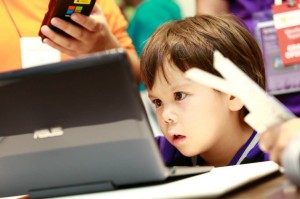This article was originally written for and posted on SafetyWeb.com. SafetyWeb is a thoughtfully designed tool that provides parents with a means and a context for ongoing family conversations about safety, friendship and how the choices we make, online and off, have consequences.

Thanks for respecting me, Mom.
If your kids are 11-17, congrats! You’ve made it to the Major League of parenting. With little ones, you didn’t need fancy plays since you called all the shots. Now there’s often grumbling in the bullpen and effective parenting is all about nuance and negotiation.
As t(w)eens step up and make more of their own decisions, parents need to gradually step back. But your job’s not done yet! Kids still need us to be plugged in and monitoring their physical, social and emotional well-being. With 3/4 of middle and high school students actively engaged in social media, they need us more than ever.
But when does conscientious monitoring of young digital citizens cross the line and become disrespectful and intrusive? Good question! Hold that thought.
Just for the record, if you’ve got evidence or a vague sense that your child is engaging in harmful activities or is being hurt, threatened or harassed, monitor the situation very closely. Act on your gut. Question your kid at length. Tell what you know, suspect and fear. Dig deep and don’t give up until you get to the bottom of what’s going on. Then offer your strongest support, providing your child the help (s)he needs and follow up!
But what if nothing’s going on? How closely should you monitor then? I often hear from good, drug-free kids, who get excellent grades. They’re indignant because Mom/Dad snoop through their email and cell phones for no known reason. They’re exhausted by a so-called Velcro parent who can’t let go and constantly texts and phones their kids all the day.
In case you’re thinking: “I have the right to check in with my kid whenever I want and to know everything my kid’s doing at all times!” With all due respect, if you don’t have probable cause for poking into the personal exchanges your kids have with their peers, you shouldn’t. All kids, especially teens, have the right to a degree of privacy.
How much privacy? How much freedom? At what age? Depends. I don’t know your child or his track record for making responsible choices when you’re not around. Besides, parenting isn’t a science, it’s an art. We’re all artists, trying to figure out how to use our tools to launch a masterpiece, i.e., a fully functioning young adult. Unfortunately, there are no easy answers. But the most effective parents create and maintain healthy boundaries with their kids.
In 21st Century parent-speak the word “boundaries” often means “rules.” As in: Parents set up the rules and the kids (hopefully) comply. This top-down, one-way approach can lead to rebellion in the ranks. Family rules are part of any discussion of boundaries, but the fact is, healthy boundaries are a two-way street. Our personal boundaries deserve respect and so do our kids’. For example:
You politely inform your 13 year old she can’t go out with her friends because she didn’t keep her agreement to finish her homework first. Furious, she blasts you with a choice sampling from her name-calling inventory. Boundary alert! Your daughter disrespected you. She deserves a consequence from you so she doesn’t think for one minute that her behavior was acceptable.
Your 14 year old mumbles something about Coach being a “jerk” for not letting the boy start in tomorrow’s game. Incensed, you grab your phone. Your son shouts, “Don’t! I’ll handle it!” Ignoring him, you call Coach and give the “jerk” an earful. Double Boundary alert! By disregarding your son’s wishes, you disrespected him. You also rudely overstepped your parenting role by intervening between coach and student.
We all want our kids’ respect. That’s why we’ve got to hold them accountable for respecting our boundaries. While we’re at it, we need to respect their boundaries too. Great advice, though not always easy to follow. But like I said, parenting is an art… you’ve got to practice to improve. Besides, we’re not looking for perfection, just progress.














